- Home
- Samantha Kane
Conall: The 93rd Highlanders, Book Two
Conall: The 93rd Highlanders, Book Two Read online
CONALL
The 93rd Highlanders, Book Two
by
Samantha Kane
Website | Mailing List
Author’s Note
Prologue
Chapter One
Chapter Two
Chapter Three
Chapter Four
Chapter Five
Chapter Six
Chapter Seven
Chapter Eight
Chapter Nine
Chapter Ten
Chapter Eleven
Chapter Twelve
Chapter Thirteen
Chapter Fourteen
Chapter Fifteen
Chapter Sixteen
Chapter Seventeen
Chapter Eighteen
Chapter Nineteen
BRODIE
MORE FROM SAMANTHA KANE
This ebook is licensed for your personal enjoyment only. This ebook may not be re-sold or given away to other people. If you would like to share this book with another person, please purchase an additional copy for each recipient. Thank you for respecting the hard work of this author.
Copyright 2014 Nancy Kattenfeld
Author’s Note
The Crimean War was fought in 1853–1856 between Russia and a coalition of Great Britain, France, the Ottoman Empire and Sardinia. Most of the fighting took place on the Crimean Peninsula in southern Russia. Russia lost the war.
Between 300,000–375,000 coalition forces died in the war. New weapon technology made battle tactics outdated and resulted in high casualties. Great Britain lost between 2,000–6,000 in battle. A little over 2,000 died later from wounds suffered in battle, and over 16,000 died from disease. There were doctors assigned to military units at the front, but the sick and wounded were sent to the British hospital in Scutari, a suburb of Constantinople in the Ottoman Empire. Hospital conditions in Scutari were deplorable, which prompted British nurse Florence Nightingale to recruit nurses to go to Scutari to care for the sick. Nightingale is considered the mother of modern nursing, and her nursing corps made a difference in Scutari, improving sanitary conditions and the morale of the sick and wounded.
The Highland Brigade fought in the Crimean War under the command of Major-General Sir Colin Campbell. The Highland Brigade consisted of the 42nd (Royal Highland) Regiment of Foot, the 79th (The Queen’s Own Cameron Highlanders) Regiment of Foot, and the 93rd (Sutherland Highlanders) Regiment of Foot. All fought bravely, but the 93rd would become known as The Thin Red Line after their famous victory over the Russian cavalry at a place called Balaclava.
Prologue
Balaclava, Russia
October 25, 1854
“Are they coming, then?” Lieutenant Conall Fletcher of the 93rd Highland Infantry Brigade asked his twin brother, Lieutenant Brodie Fletcher. Brodie peered to the left to try to see down the valley. He just shook his head at Conall when he looked back. They could see nothing from where they stood, but the sound of gunfire and the shouts of men and horses easily reached Conall’s ears.
The English and French bombardment of the Russian supply base at Sevastopol had failed the week before. Now the Coalition was defending their own supply route at the port of Balaclava as the Russians retaliated. The 93rd were the last line of defense in the South Valley, Balaclava at their back. As the day had begun they hadn’t expected to see heavy fighting. Now the battle-hardened men under Conall’s command were tense. He’d seen less fighting than most of them, and he’d learned to listen to their instincts.
“Get ready,” he told Brodie, his voice tight. “They’ll be here soon.”
“Well, goodbye, Mr. Fletcher,” Brodie said solemnly.
“Goodbye, Mr. Fletcher,” Conall replied. It was their customary prebattle routine. Today Conall was glad they decided to do such a silly thing. He wasn’t ready to die without saying goodbye to Brodie.
“The Russian cavalry’s coming from the Causeway Heights, men,” the Highland Brigade Commander Sir Colin Campbell called out, calm and cool. “Just four hundred or so. Form two lines only.”
Conall snorted, amused in spite of the fear racing through him. Sir Colin must have little to no respect for the Russians if they were only forming two lines instead of the usual four. He signaled his men and called out the order, watching with pride as they formed the lines without an ounce of fear on their faces.
“Connie.” He looked over to see his older brother Major Douglas Fletcher glaring at him as he walked closer. “You stay out of the way,” Dougie told him. “I’ll not be writing to Mum about your dead body.” He looked over at Brodie. “You too,” he said harshly.
Brodie scoffed and waved a hand at him. “Go on with you, then,” Brodie said dismissively. “Get over there and see to your men.”
“Goodbye, Mr. Fletcher,” both Conall and Brodie called after the retreating Dougie. He ignored them, as usual.
Conall looked over at Captain Graeme Munro. Munro was watching him intently as he often did, and once again Conall wondered what he was thinking. Munro was about Dougie’s age, taller than almost anyone else in the 93rd, big and brawny and quiet as a mouse. You never knew what the man was thinking.
“See to your men, Lieutenant,” Munro said, his deep voice carrying without having to holler. “Then fall in line.”
“Yes, sir,” Conall said. As he went to stand with his men, he looked out at the valley and saw the Russian cavalry thundering toward them. The numbers were about even between them, but infantry against cavalry usually turned into a bloody hell for the infantry. He took a deep breath and ordered his men to arms.
“Men,” Sir Colin called out, riding up and down the line. “Remember there is no retreat from here. You must die where you stand.”
They must have made quite a sight, standing side by side in their Black Watch kilts with their scarlet jackets and tall black feathered bonnets. Conall was proud to stand with the 93rd and he’d be proud to die with them too. Someone jostled his arm and he looked over to see that Munro had taken up position next to him.
Unbidden, the thought of Mrs. Scott, a widow back in camp, came upon him. She was sweet, small, patient and practical. Her blonde hair had looked like wheat shining in the sun as she’d stood there and waved the men off. Conall had wanted her from the moment he met her. He’d quietly courted her, but to no avail. She’d not marry him. She’d offered him her bed and he’d refused out of respect for her, not wanting to treat her so shabbily. Now he was wishing he’d taken her up on her offer. He could certainly have courted her from between her legs as easily as not.
Conall heard Sir Colin give the order for the first volley and the men in the front line fired at the oncoming cavalry. Nary a shot hit a mark. They were too far away. The second volley rang out and Conall noticed the Russians seemed to swerve and there was some confusion among them. They were firing steadily at the Highlanders, most shots missing their mark as well. All of a sudden Conall was shoved forward as Munro shouted at him, and as he was going down he felt a sharp pain in his right shoulder. It dropped him to his knees.
A third volley was fired at the Russian flank and the cavalry made a sharp turn to their left and thundered back down the valley, away from the 93rd. Conall fell to his side, his arm a burning pain that made him gasp. There was shouting and smoke still lingered, obscuring his view of the men around him. Several came close to stomping on him. And then Munro was there, kneeling beside him and lifting him up into his arms.
“Be careful, man,” Conall gasped. “I’ve been hit in the arm.”
“Thank God,” Munro said fervently. He peered into Conall’s eyes and down at his arm and then back into his eyes. “I thought I’d lost you.”
; Conall couldn’t look away from Munro’s dark eyes. For once they weren’t cold and blank, but filled with emotion, wild and hot and more intense than ever before. There were things there that Conall’s mind, clouded by pain and exhilaration from the battle, couldn’t decipher. For one brief, mad moment he thought Munro was going to kiss him, and he leaned up toward him, wanting it. Then Munro jerked away from him and Conall came to his senses.
“It’s just a flesh wound,” he told Munro, his voice shaky.
Dougie came running over and fell to his knees beside them and began tearing at Conall’s jacket.
“Ow!” Conall howled. “What are you doing, you big looby? I’ve just been shot, for God’s sake.”
“Douglas.” Captain Iain Roberts, Douglas’s best friend, came over and put a hand on his shoulder. “Dougie, the boy’s fine. He’s fine.” He squeezed Dougie’s shoulder and shook him and Dougie sat back, gulping in air as he looked around, dazed.
“Ham is down,” Brodie came over and said cheerfully, referring to their other brother, Hamish. “It’ll be the hospital at Scutari for both of you.”
“What’s wrong with Ham?” Dougie demanded.
“You’ll soon find out,” Brodie said with a laugh. “He’ll never live it down.” He squatted beside Conall. “You’ve got to learn to duck faster, man. Those Russians can’t hit the side of a barn, but you make an easy target for sure.”
“Munro saved me,” Conall said, looking up at the man whose face was blank once again, his thoughts and feelings locked away. But Conall knew what he’d seen, and he wouldn’t forget it. “He pushed me down.”
“We all owe you,” Dougie told Munro solemnly. “Fletchers pay their debts.”
Munro slid Conall off his lap and stood. He kept hold of Conall’s good arm and helped him up. “I tripped and shoved him down,” he said without meeting Conall’s eyes. “No heroics here.”
The next day Conall left for Scutari, dazed, confused and happy to be alive. He was already missing Mrs. Scott. But it was Munro’s eyes, full of anguish and wild emotion that haunted him as he was carried away.
Chapter One
January, 1855
Sevastopol, Russia
93rd Highlander Encampment
Conall whistled and called out before he entered Mrs. Scott’s hut. He’d come here first, as soon as he’d reported in from Scutari and dumped his sack in the tent he shared with his brother Brodie. Perhaps she’d changed. He knew he had. Perhaps she’d left, although he’d asked around and been told she was here. He hoped she was. His heart was beating a rapid tattoo, anticipation firing his blood and flushing his cheeks. His hands were sweating in his gloves.
“Come on,” she called out.
“Who is it?” a man asked. Conall felt a burst of unreasonable anger. Mrs. Scott did laundry and cooked for a number of the men in the 93rd, and even other Highland regiments. But this voice sounded far too proprietary for Conall’s liking. Had she taken up with someone while he’d been gone, cooling his heels in the hospital at Scutari? So close and yet so far from Mrs. Scott. Had he lost his chance to be with her? For the hundredth time he cursed the Russian bullet that had laid him low at Balaclava.
He ducked into the hut, his hand on his sporran, but came up short when he saw the occupants. They were as arrested at the sight of him. It was Captain Munro with her. He had saved Conall’s life at Balaclava. Mrs. Scott spoke first, her voice breaking slightly, not the practical tones he remembered so well.
“Lieutenant Fletcher,” she said. “You’re back.” She smiled, and it was a tremulous, beautiful thing. Her thick blonde hair was escaping its black bonnet and her blue eyes looked a little bruised and weary. She was a bonnie lass to him, and always had been, but he wasn’t blind. Hard work and a hard life had made her rough around the edges, perhaps a little older than she ought to be. Conall grinned back.
“Aye, I am.” He shook his arm, the one that had been shot. “Hale and hearty.”
“And a stone lighter,” she chastised, brushing her hands off on the apron she wore over a heavy gray coat. “Didn’t they feed you?”
“Fletcher,” Munro said in greeting. “I didn’t know you were coming today.”
“I didn’t either,” Conall admitted. “I caught a wagon coming this way from Scutari last week. I figured I’d arrive before a letter. Hamish came with me.” He looked over at Munro as he spoke. In addition to saving Conall’s life at Balaclava, he’d interceded on his behalf a dozen times in the past few months, showed him through words and deeds what was expected of him here, and how to stay alive. And yet Conall felt as though the older, taller dark-haired Scot was a stranger. He’d never let Conall in, never shared his past or his laughter. He was a gruff, kind mystery who had always watched Conall with an uncomfortably intense gaze.
Munro nodded, unsmiling. He reached down and picked up his forage cap. “It’s good to see you,” he said, his tone flat and emotionless. “I’ll take my leave, then. Good afternoon, Mrs. Scott.” His behavior now made Conall think he’d imagined other things at Balaclava, like the captain’s anguish at Conall’s injury, and the heat between them. He was glad. The idea of what it meant had worried him while he was away.
She nodded without looking at Munro. “Good afternoon, Captain.”
Conall caught Munro’s arm as he passed. “Thank you again for saving my life.”
Munro shrugged. “It was a happy coincidence.”
“No, it wasn’t,” Conall said, shaking his head. “If you hadn’t shoved me out of the way, that bullet would have gone through my heart and not my arm, and we both know it.”
“Yes, but I wasn’t shoving you out of the way of the bullet,” Munro said patiently. “I was just shoving you.” He tipped his hat. “Good afternoon.” He stepped out of the hut and quietly closed the door.
When they were alone Mrs. Scott turned her back to Conall, bustling about. “Are you hungry, then? Fare is scarce these days. This winter is killing us faster than the Russians.”
“I missed you,” Conall blurted. “Thought about you. Are you getting on all right? Has someone been taking care of you?” Worry for her had kept him up at night, chafing at the bit to return to camp, to make sure she was all right. Ever since September when her husband had died at the Alma she’d struggled along, taking in wash and cooking for the pittance the soldiers could pay her. He’d been sharing his own provisions with her before he fell at Balaclava.
She froze for a moment and then spun to face him. “And is that what’s been worrying you? That someone else has been taking care of me?” She seemed angry, though Conall couldn’t imagine why.
“I hoped someone was,” he said. It wasn’t a complete lie. He wanted her warm and fed, but he didn’t think he’d take the news of a lover well. “Is it Munro?”
“Is it Munro,” she repeated his words with an inflection he couldn’t decipher. “Well, now, I won’t lie, I was hoping it would be.”
Conall felt the color drain from his face. He’d wanted to be the one. Surely she knew that? “If that’s what you want, then I’m sure he’ll do the right thing,” he forced out of a tight throat.
“No, the captain is too honorable for that,” she said mockingly. “He’ll plant himself in front of my hut like a thorn bush, driving every other prospect away, but he won’t take advantage of a poor widow. His words, of course. I’d never call myself that.” She made a face. “As though I was a charity case.” She crossed her arms militantly. “And what of you?” she demanded. “Are you come on the same errand? Or are you going to finally make me your woman? You went and got yourself shot and I thought you were going to die, you bastard. And then you come back and want to know if I’m all right.” She sniffed and turned away. “I’m getting on. There? Feel better?”
“Mrs. Scott,” he began placatingly, not sure what to say. Did she want him or Munro? Or anyone? For the first time he wondered if she’d take him for protection even if her heart wasn’t engaged. He knew beyond a shadow of a doubt th
at wasn’t what he wanted.
“Avril,” she said softly. “I’d like to hear someone say my name. It’s been so long.” She still wasn’t looking at him.
Avril. He hadn’t known her Christian name. It fit her. Some might say such a lyrical name was misplaced on the practical, handsome Mrs. Scott, but not Conall. There was beauty in her strength, a song of Scotland in her voice. “Avril,” he said quietly.
She spun around to face him. “Conall.” She said his name for the first time and it tripped off her tongue with the kind of longing he’d often dreamed of. She came to him then, first untying her bonnet and letting it fall to the small cot against the back wall of the hut.
Avril watched Conall warring with something inside him. She didn’t want to give him time to think that hard. She needed a man. Not just to protect her, but in her bed. She missed it. Missed the closeness of it, the kisses, the joy, the pleasure of it. She was a woman who enjoyed the sexual act, something her late husband had appreciated. But she knew there were men who didn’t, who thought it wasn’t a woman’s place. Avril wanted none of that. Best to know where he stood now.
She walked briskly over to him and wrapped her arms around his neck. He looked shocked, but then she sealed her lips over his and couldn’t see his expression anymore. He felt as good as she’d thought he would all these long months. He’d been coming around since almost right after Tom’s death, sniffing around her skirts. He was younger than she, and she felt a fool for even trying to seduce him. He was bonnie and braw with his red hair and broad shoulders, brave and kind, and the few lasses here gazed after him with the same sort of longing she felt, but she’d tried hard not to show it. She wouldn’t be one of those silly girls. That wasn’t what he wanted from her.

 Mission to Love (Brothers in Arms Book 14)
Mission to Love (Brothers in Arms Book 14)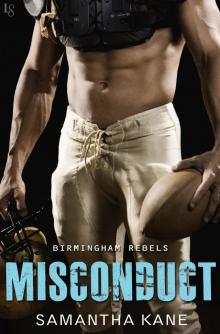 Misconduct
Misconduct Jacked Up
Jacked Up Love's Fortress
Love's Fortress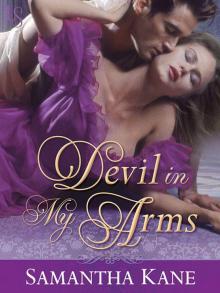 Devil in My Arms: A Loveswept Historical Romance (The Saint's Devils)
Devil in My Arms: A Loveswept Historical Romance (The Saint's Devils)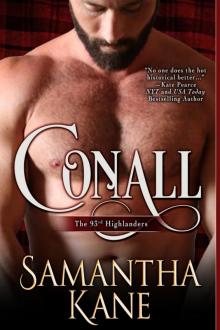 Conall: The 93rd Highlanders, Book Two
Conall: The 93rd Highlanders, Book Two Brothers In Arms 05: Retreat From Love
Brothers In Arms 05: Retreat From Love Cherry Pop (Mercury Rising Book 3)
Cherry Pop (Mercury Rising Book 3)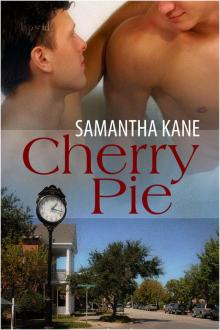 Cherry Pie
Cherry Pie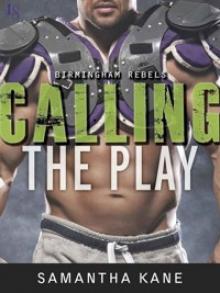 Calling the Play
Calling the Play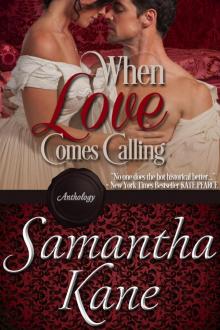 When Love Comes Calling: Two Short Stories
When Love Comes Calling: Two Short Stories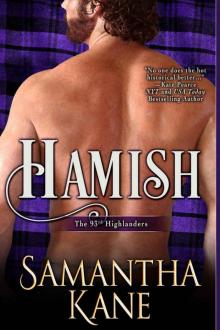 Hamish (The 93rd Highlanders Book 1)
Hamish (The 93rd Highlanders Book 1) Love's Strategy
Love's Strategy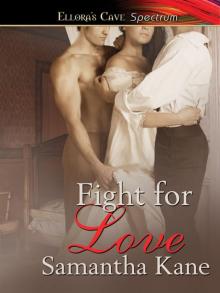 FightforLove
FightforLove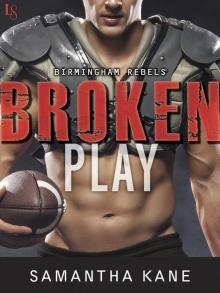 Broken Play
Broken Play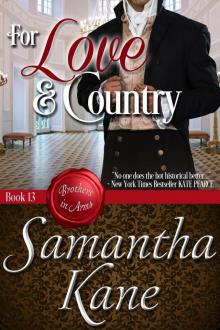 For Love and Country (Brothers in Arms Book 13)
For Love and Country (Brothers in Arms Book 13)